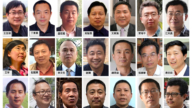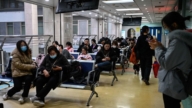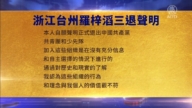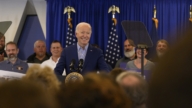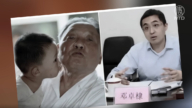【新唐人2013年06月22日訊】6月20號,是中共紀委要求紀檢監察幹部,自行清退所收受的各種會員卡最後期限。不過,民間各高級會所透露,他們的會員卡沒有實行實名制,「會員卡主人」很難查實。與此同時,部分單位出現無人退卡現象。因此,中國民眾認為,「退卡現象」的出現,一方面證明中共的所謂自我淨化機制失效,一方面說明中共反腐進入了一個宭境。
中共紀委出爐的清退會員卡規定,要求紀委檢查系統內官員,填寫清退會員卡承諾書,大致內容是承諾手裡沒有會員卡, 填寫之前如果已將卡清退,就不會追究責任。
但是《北京晨報》報導,一些送卡的人以公司的名義購卡後再轉送給官員﹔而一些高檔消費場所出售的部分會員卡,只憑密碼消費,不做消費者身份信息登記﹔還有,經營紅酒消費的高檔會所人士表示,大部分會員卡為企業應酬和禮物往來所用,他們無權知道持卡人的信息。因此誰擁有了這張卡﹖很難查實「會員卡主人」。
北京時政觀察人士華頗:「這個措施一出來,好些會所曝光,我們的會員卡根本就沒有實行實名制,你拿著會員卡就可以到我這兒消費,就這一件事情來講,它本身就缺乏一種監督機制,效果是無法看到的,放大來講,說明中共反腐進入了一個宭境。」
北京時政觀察人士華頗還告訴《新唐人》,很多官員以家庭成員的名義持有會員卡,自己只管消費就夠了。
而報導說,清退會員卡行動在各級紀檢監察系統推進的同時,部分單位出現無人退卡現象。
華頗指出,中共歷來依賴紀委反腐,現在紀委也出現腐敗,可見無法指望中共自我淨化。
北京時政觀察人士華頗:「中共是自己反自己、自己監督自己、自我清洗、自我淨化、甚麼都是靠自己,這種反腐肯定是不徹底,不會解決實際問題的,這個數據是甚麼﹖中紀委是不是可以向外界公布,有多少人﹖清退了多少卡﹖」
中國公民監政會發起人郭永豐認為,清退會員卡是中共展現的又一騙人把戲。
郭永豐:「整個一個爛透了的政黨,你怎麼能自己治自己的病呢﹖你已經沒有資格、沒有權利這樣說了,因為你本身已經爛透了,所以說共產黨這一套千萬不要再相信了,再相信就要禍國殃民,延誤時機,我認為共產黨唯一一個選擇之路就是接受人民的監督,開放報禁和黨禁,實行三權分立、民主政體、軍隊國家化,實行多黨執政。」
據中共喉舌媒體《新華網》報導,部分私人會所銷售員透露,「清退會員卡」不會影響到商家生意,因為任何人都查不到他們會員的任何信息,私密性非常到位。
華頗:「中共已經是非常的奢侈之風蔓延,腐化墮落已經非常嚴重了,你讓他去過簡樸的生活,對這些人來講比死還難受,習近平這把火能燒到甚麼程度,能達到甚麼目地,還要拭目以待。」
中國《南都網》報導指出,習近平的八項規定出臺後,各地還出現了各種名目的應對辦法。例如,一些單位把五星級酒店的大廚請到單位食堂,內部食堂豪華程度可以與五星級酒店媲美,酒店裡能吃到的單位食堂也能吃到。部分單位為了繞開公務用車指標的「障礙」,直接從租車公司租用車輛等等。
還有單位宣稱,落實八項規定後,本單位的公務接待費下降了50萬元,但是卻隱瞞同期增加的30萬協調費、及20萬管理費。江蘇某地組織80多名幹部赴廈門開務虛會,主要「議程」之一卻是參觀景區,「旅遊費」成了「會務費」。
採訪編輯/劉惠 後製/周天
China’s Official Campaign: The Returning of VIP Membership Cards
June 20 was the deadline of a campaign for returning VIP
membership cards that China’s officials have received as gifts.
The drive was launched by the Central Discipline
Inspection Commission (CDIC) of the communist regime.
However, VIP card providers have told media that
they have never registered VIP members’ real names.
It is difficult to verify who are the real card holders.
According to reports, zero VIP cards have been
returned in some state departments.
Political observers say, the situation proves the failure of
the self-purification drive of the Chinese Communist Party.
Also, it indicates that the CCP’s corruption battle
has been caught in it’s own trap.
The CDIC demanded that CCP officials make
written promises to return old VIP cards.
If they still keep membership cards in hand,
they’ll be investigated and held accountable.
However, the Beijing Morning Post reported that
some VIP cards were bought in names of companies,
and passed as gifts to individual officials afterwards.
Whilst some VIP cards for luxuries only need a
password input to be used to consume.
Sources from high-end wine vendors reveal that
most VIP cards were gifts for business entertainment.
The disclosure of private information
about individual cardholders is not allowed
So the identity of a VIP cardholder is effectively
impossible to discover in practice.
(Political observer, Beijing) Hua Po: “The measure has
exposed the irregular practice of many VIP card providers.
They have denied the existence of real-name
registration for membership.
This issue has exposed the total lack
of an oversight mechanism.
Overall, it indicates that the CCP’s anti-corruption drive
has been landed in a dilemma.”
Hua Po reveals that many officials received VIP cards as gifts,
which had been registered in names of family members.
According to the Beijing Morning Post,
in some CDIC offices at all levels,
no VIP cards have yet been returned.
Hua Po comments that all along, the CCP has
relied upon the CDIC to combat corruption.
But now corruption has grown inside the CDIC as well.
It is evident that the public cannot count on
the CCP’s “self-purification”.
(Political observer, Beijing) Hua Po: “The CCP has
actually combated, overseen and purified itself.
It relies on itself in doing everything.
Such an anti-corruption action is certainly
a halfway measure, and therefore unrealistic.
Can the CDIC make public the information of
how many officials have returned VIP cards, and
how many cards have been returned by these officials?”
Guo Yongfeng, founder of NGO Chinese Citizen Watchdog,
considers the campaign another CCP scam.
Guo Yongfeng: “It is a political party rotten to the core.
How can it cure its own disease?
It lacks the credibility to do this,
as it has always been thoroughly rotten.
So no one should realistically continue to
believe in the CCP’s touting.
Any faith in it’s talks will only lead to more disasters that
will be brought to the nation and to the Chinese people.
I believe that the only option available for the CCP
is to put itself under the public watchdog.
It should lift bans on press freedom and
on setting up political parties.
Also, it should implement separation of powers, democracy,
military nationalization, and multiparty politics.”
Xinhua News Agency has reported that salesmen from
some private merchants have said that the campaign
won’t affect their businesses.
This is because the information about their card members
is and will continue to be kept very private.
Hua Po: “Lavish spending of CCP officials has
spread all over China, they’ve been very depraved.
Now you ask them to live an austere life,
that is a fate worse than death for them.
How will Xi Jinping take the next step?
What’s the result it may produce? It remains to be seen.”
Nandu.com has reported that China’s local authorities
have invented ways to get around Xi Jinping’s Eight Rules,
which forbid lavish, public-funded banquets.
For example, the canteens of some state departments
have hired five-star hotel chefs.
The canteens have been decorated like highly rated hotels.
Some departments, in order to circumvent the bans
on using official cars, have used car rental companies.
Some of China’s state departments have alleged that
the implementation of Xi’s Eight Rules has caused a drop
by 500,000 yuan in hospitality expenditure.
However, they have concealed the cost of fee increases
in coordination and management,
these costs run to 300,000 yuan and
200,000 yuan, respectively.
Reportedly, over 80 officials in Jiangsu province
traveled to Xiamen for a “meeting”.
One of the main items on the agenda
was to visit local attractions.
The “traveling expenses” were finally recorded
as “meeting expenses”.




